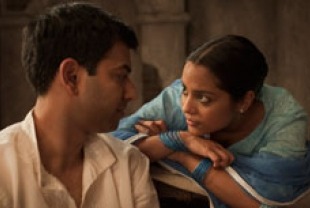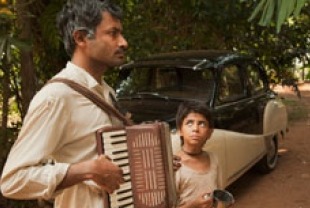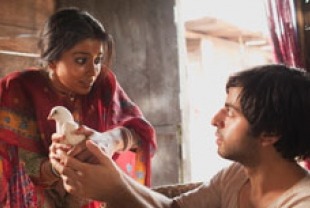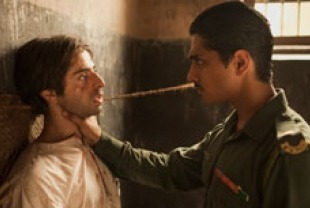Deepa Mehta, who has already directed Water one of the best films ever made about the partition of India at independence, takes on an even bigger challenge in adapting Salman Rushdie's monumental 1981 novel, a literary blend of history and magical realism. The resulting film is a wide-ranging story, drawing together the strange life and adventures of the protagonist and the complicated and violent history of postcolonial India with its regional wars, less than glorious leaders, and continuing struggle with diversity. Rushdie wrote the screenplay and also serves as narrator of Midnight's Children.
Saleem Sinai (Satya Bhabha) is born "at the glorious hour of India's independence" (August 15, 1947) from colonial rule by Great Britain. He begins unspooling his story with some whimsical vignettes from his grandfather's experiences as a Muslim doctor (Rajat Kapoor)who marries a no-nonsense woman and fathers three daughters. He is happy when his favorite, Amina (Shahana Goswami), marries a poet, even though they end up hiding in the basement and have no sex life. Thanks to the betrayal of a sister who is attracted to an arrogant and chauvinistic Muslim soldier, this union is short-lived. Amina then weds Ahmed Sinai, a wealthy businessman, and they move to Bombay where they buy a mansion from a departing British aristocrat (Charles Dance) who exhibits some of the worst character qualities of the colonists. Soon she is pregnant. So, it turns out, is a poor woman married to a street entertainer who regularly stops by the mansion.
Both women deliver on the historic night of independence. The hospital nurse, Padma (Seema Biswas), is in love with a communist who believes the rich need to become poor and the poor rich. To prove her loyalty to him, she switches the two babies; now the rich boy will grow up with the beggar, and the beggar's boy will have all the upper class advantages. Amina and Ahmed name their boy Saleem, and Padma is hired to be the baby's nanny. She observes both him and the beggar's boy, Shiva, with a growing sense of guilt.
Saleem's father (Ronit Roy) has high hopes for his son but the boy is a disappointment to him. He does have special powers — rumor has it that the 581 children born at that auspicious midnight all do. Saleem can communicate with the others telepathically and summon them by manipulating his nose. In surrealistic segments of the film, he convenes gatherings where they discuss what they can do about what's happening all around them. Although meant to convey the convulsions in the subcontinent between the rich and the poor, Muslims and Hindus, these sections of the film come across as interruptive and merely strange, neither edifying nor inspiring.
Director Deepa Mehta weaves key events in the early history of India and Pakistan into the narrative, from partition through the 1965 war between the two new countries, to the succession of Bangladesh from Pakistan in 1971. Along the way, we see examples of government corruption in both countries, military take-overs in Pakistan and abuse of power by Prime Minister Indira Gandhi in India.
The stories of Saleem and Shiva are used to convey all the turmoil. Saleem goes to live with his aunt in Pakistan and sees his family killed during the Indo-Pakistani war; he then suffers from amnesia for six years, regaining his memory in Bangladesh. Shiva grows up into an aggressive young man and becomes an Indian war hero. As a general he hunts Saleem down and finds him in a magician's ghetto which is being bulldozed. Parvati (Shriya Saran), another of the Midnight Children with powers as a witch, is living there and uses magic to save her child. By the end, all the strands of this strange story come together with a reunion of Saleem and Padma in Bombay.
From the beginning of this ambitious film, writer Rushdie and director Mehta try to show that the destiny of the characters are intimately linked to the development of their countries. And much does happen during these years! At the end, we agree with the narrator who declares that "the truth has been less glorious than the dream."



